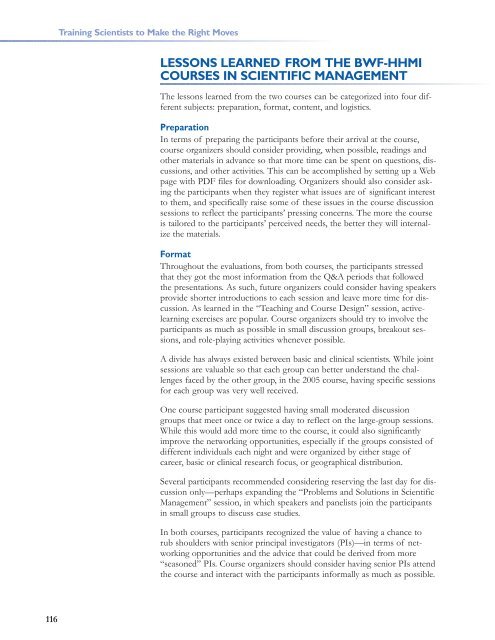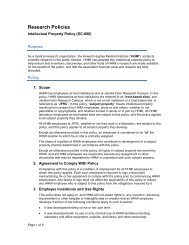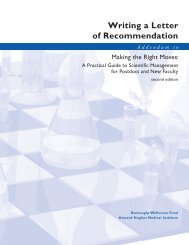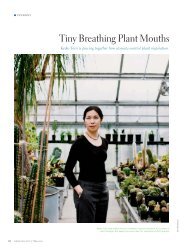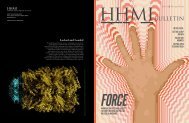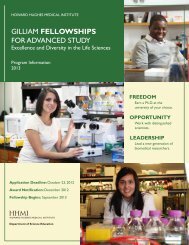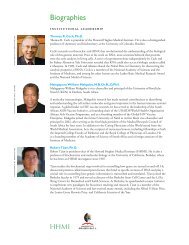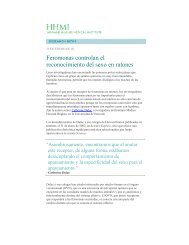Training Scientists to Make the Right Moves - Howard Hughes ...
Training Scientists to Make the Right Moves - Howard Hughes ...
Training Scientists to Make the Right Moves - Howard Hughes ...
You also want an ePaper? Increase the reach of your titles
YUMPU automatically turns print PDFs into web optimized ePapers that Google loves.
<strong>Training</strong> <strong>Scientists</strong> <strong>to</strong> <strong>Make</strong> <strong>the</strong> <strong>Right</strong> <strong>Moves</strong><br />
LESSONS LEARNED FROM THE BWF-HHMI<br />
COURSES IN SCIENTIFIC MANAGEMENT<br />
The lessons learned from <strong>the</strong> two courses can be categorized in<strong>to</strong> four different<br />
subjects: preparation, format, content, and logistics.<br />
Preparation<br />
In terms of preparing <strong>the</strong> participants before <strong>the</strong>ir arrival at <strong>the</strong> course,<br />
course organizers should consider providing, when possible, readings and<br />
o<strong>the</strong>r materials in advance so that more time can be spent on questions, discussions,<br />
and o<strong>the</strong>r activities. This can be accomplished by setting up a Web<br />
page with PDF files for downloading. Organizers should also consider asking<br />
<strong>the</strong> participants when <strong>the</strong>y register what issues are of significant interest<br />
<strong>to</strong> <strong>the</strong>m, and specifically raise some of <strong>the</strong>se issues in <strong>the</strong> course discussion<br />
sessions <strong>to</strong> reflect <strong>the</strong> participants’ pressing concerns. The more <strong>the</strong> course<br />
is tailored <strong>to</strong> <strong>the</strong> participants’ perceived needs, <strong>the</strong> better <strong>the</strong>y will internalize<br />
<strong>the</strong> materials.<br />
Format<br />
Throughout <strong>the</strong> evaluations, from both courses, <strong>the</strong> participants stressed<br />
that <strong>the</strong>y got <strong>the</strong> most information from <strong>the</strong> Q&A periods that followed<br />
<strong>the</strong> presentations. As such, future organizers could consider having speakers<br />
provide shorter introductions <strong>to</strong> each session and leave more time for discussion.<br />
As learned in <strong>the</strong> “Teaching and Course Design” session, activelearning<br />
exercises are popular. Course organizers should try <strong>to</strong> involve <strong>the</strong><br />
participants as much as possible in small discussion groups, breakout sessions,<br />
and role-playing activities whenever possible.<br />
A divide has always existed between basic and clinical scientists. While joint<br />
sessions are valuable so that each group can better understand <strong>the</strong> challenges<br />
faced by <strong>the</strong> o<strong>the</strong>r group, in <strong>the</strong> 2005 course, having specific sessions<br />
for each group was very well received.<br />
One course participant suggested having small moderated discussion<br />
groups that meet once or twice a day <strong>to</strong> reflect on <strong>the</strong> large-group sessions.<br />
While this would add more time <strong>to</strong> <strong>the</strong> course, it could also significantly<br />
improve <strong>the</strong> networking opportunities, especially if <strong>the</strong> groups consisted of<br />
different individuals each night and were organized by ei<strong>the</strong>r stage of<br />
career, basic or clinical research focus, or geographical distribution.<br />
Several participants recommended considering reserving <strong>the</strong> last day for discussion<br />
only—perhaps expanding <strong>the</strong> “Problems and Solutions in Scientific<br />
Management” session, in which speakers and panelists join <strong>the</strong> participants<br />
in small groups <strong>to</strong> discuss case studies.<br />
In both courses, participants recognized <strong>the</strong> value of having a chance <strong>to</strong><br />
rub shoulders with senior principal investiga<strong>to</strong>rs (PIs)—in terms of networking<br />
opportunities and <strong>the</strong> advice that could be derived from more<br />
“seasoned” PIs. Course organizers should consider having senior PIs attend<br />
<strong>the</strong> course and interact with <strong>the</strong> participants informally as much as possible.<br />
116


